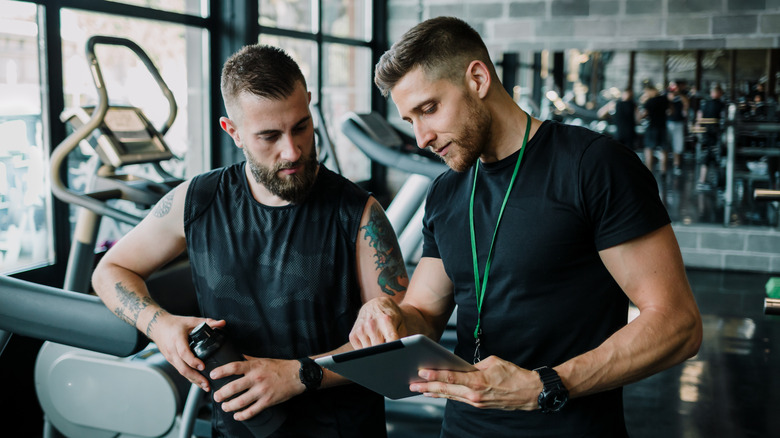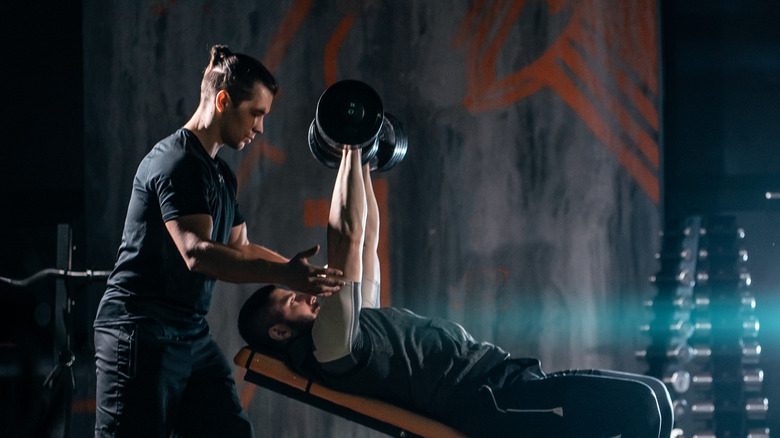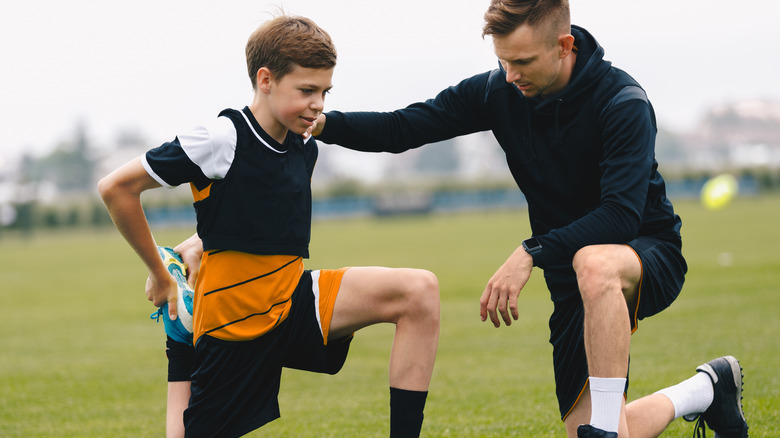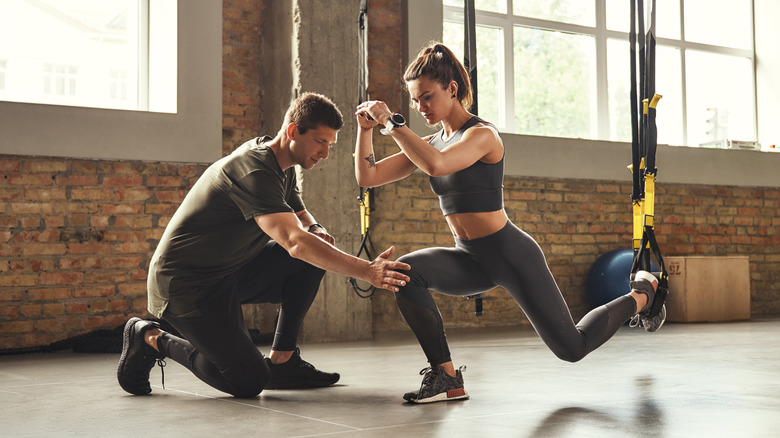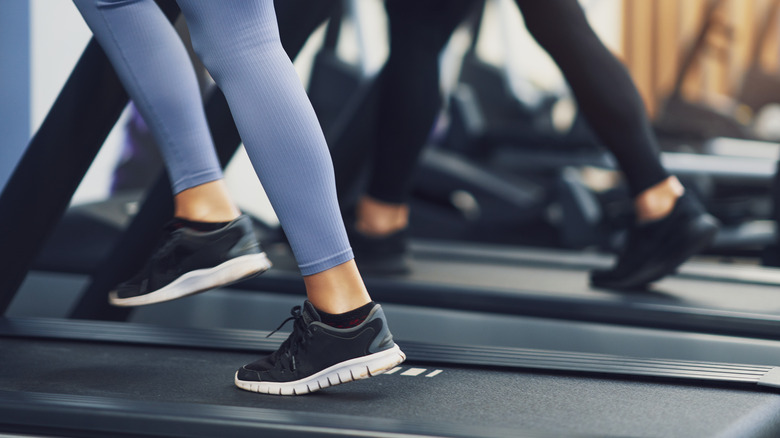Questions You Should Be Asking Your Personal Trainer
Hiring a personal trainer is easier than trying to achieve your fitness goals without any help. It's similar to hiring an accountant. You can use a tax software program to enter all your info and do things yourself, but if you make a mistake, it could be costly. Accountants help you avoid mistakes, save you time, and potentially save you money in the long-term. Personal trainers teach you proper technique to avoid injury, give you a program suited to your goals, and can work around health problems.
In the fitness industry, "personal trainer" is an umbrella term that can mean many things. According to experts at the American Fitness Professionals and Associates, a personal trainer can work in one-on-one settings or with a group of people. You can find trainers in gyms, through private companies that bring trainers to your home, or online. If you find a trainer you trust and enjoy, they'll become your go-to resource for fitness and health questions. To get the most out of your training, be inquisitive and ask for their help when you need it!
What are your qualifications?
Before signing up with a new personal trainer, ask about their certifications. The standard you should look for is called a "Certified Personal Trainer" certification (or CPT). While some other certifications (such as strength and conditioning, group fitness, and health specialist certifications) are acceptable, CPT is the standard. Your trainer might have other certifications on top of that, such as a kettlebell or yoga teacher certification. A certification is one way to make sure that your trainer has a base knowledge of fitness, health, and exercise technique.
You can ask what organization your trainer was certified through if you're curious. There are many established organizations that certify trainers, such as the American College of Sports Medicine, the National Strength and Conditioning Association, and the American Council on Exercise. All the criteria for certification are different, but most require an exam to pass. Once certified, trainers usually need to maintain their certifications with continuing education credits. The American Council on Exercise, for example, requires 20 hours every 2 years to maintain certification.
Do you have a specialty?
The CPT is the baseline for personal training certifications, but there are other, more specialized certifications out there. If you're looking for an expert in a particular area, you can look for trainers with certifications that match. Fitness is a broad field, and there are many sub-specialties. For example, yoga and Pilates are different. Weight training and running require different knowledge. There are even certifications specifically for kettlebells, which are a type of weightlifting equipment.
One certifying body, the International Sports Sciences Association, lists the different certification specialties they offer on their website. They have certifications for nutrition and longevity, teach group classes, kickboxing, yoga, and weight management, to name a few. Many certifying organizations offer specialties to personal trainers. Depending on how motivated your trainer is to expand their offerings, they may have multiple specialty certifications that can give you a better idea of their interests. It also helps if your trainer has experience in the things you're interested in, such as long-distance running or strength training.
How often should I work out?
When you find your perfect trainer one of the first things you might do is set up a regular schedule. This is when you trainer will plan out your routines. One thing they'll think about is how many days per week you're working out. If you're unsure how often to workout, your trainer can work with you to decide. They can help balance the work you do with them and other workouts you do throughout the week.
The American Heart Association recommends at least 150 minutes of moderate-intensity aerobic exercise or 75 minutes of vigorous aerobic activity every week. On top of that, they recommend at least 2 days per week of resistance training. With your trainer, you might do aerobic training, resistance, or some combination of the two. Your trainer can help you figure out how much time you should dedicate to other activities to fill your weekly exercise goals. If you don't hit your goals in the gym with your trainer, they can recommend workouts or other fitness services that help you round out your exercise program.
What exercises are right for me?
The types of exercises that your trainer picks should be dependent on your goals. Lifting weights will help you build muscle, for example, while running is good for endurance. Some activities might overlap and do a mixture of multiple things. You can ask your trainer to help you figure out the best form of activity for you based on any current injuries or health issues, fears you may have surrounding exercise, and what you want to accomplish.
If you want more aerobic activity, for example, your trainer might recommend high-intensity interval training. According to the Department of Health and Human Services, high-intensity interval training is a workout with short bursts of intense activity (such as sprinting) mixed with low-intensity recovery periods (such as walking). For strong muscles, your trainer might recommend a mixture of dumbbell, resistance band, or bodyweight exercises. Feel free to ask your trainer why they picked certain exercises, and how they'll help you achieve your goals.
How do I work around injuries?
Injuries can be a drag on your workout routine. When you're on your own, an injury can derail you from your workouts because you don't know how to properly work around it. A personal trainer can help you decide which exercises are safe and which to stay away from. That way, you can get back in the gym and continue working towards your goals.
Injuries are an inevitable issue, according to the American College of Sports Medicine. Trainers should focus on proactively helping clients through difficult times by adjusting or substituting exercises to work around the injury. One way to do that is to figure out what exercises you can do without feeling pain. If you're weight training, you might need to start by testing an exercise without weight. It's also possible for a trainer to modify a painful exercise so that it doesn't hurt.
What should I eat before workouts?
If your trainer is capable of and willing to give nutrition advice, they can help you figure out what to eat before a workout. Even though you might not think about it, the food you eat (or don't eat) before a workout can affect your performance and the way you feel during a workout. For example, eating a large meal right before a workout can make you feel sick.
Eating before a workout is helpful because it replenishes something called glycogen. The National Academy of Sports Medicine explains that glycogen is a form of carbohydrate which is meant for short-term use. The article continues to say that you don't need a lot of food to provide energy for a workout, but it does help to have a little. They recommend eating primarily carbohydrates (such as bagels or fruit) before a workout to supply energy. They also recommend staying hydrated by drinking at least 4 hours before your workout.
Can you help me get better at a specific sport?
Some trainers specialize in training athletes. The National Strength and Conditioning Association has a few certifications for trainers who want to specialize in working with athletes. You can look for a trainer with one of these certifications or with knowledge and experience involving your sport of choice.
A trainer that decides to work with athletes will learn a slightly different skillset. As the American Council on Exercise explains, they teach power and agility exercises, strength training exercises geared towards sports, and nutrition strategies in their sports performance certification. Their program prepares trainers to work with both youth and adult athletes. If you want to get better at a sport, you should look for a trainer who can tailor your workouts to the demands of your chosen activity. It's also important to send younger athletes to a specialized sports trainer who knows how to correctly guide their development.
How's my form on this exercise?
One of the most important things a trainer can do is teach you correct exercise technique. As your trainer watches you exercise, they can guide you into the proper position for each exercise, which helps you get the most out of each movement. You'll avoid injury by using proper technique, and potentially increase your performance in each exercise.
The Mayo Clinic points out that even picking up weights to put them back on a weight rack requires proper form. Another aspect of exercise that a trainer can help with is proper breathing. Whether you're lifting weights, performing yoga poses, or running, breathing is important. You should exhale when you lift a weight and inhale when you lower it. They also point out that you shouldn't hold you breath during an exercise. You trainer can remind you of these details during a workout session.
This exercise hurts, can I modify it?
If you get injured outside of the gym and need to adjust, your trainer can help. Sometimes, however, you may feel pain during a workout and your trainer may need to modify the exercise on the fly. Pain is a sign of potential injury, says Dominic King, a sports medicine physician at the Cleveland Clinic. When you feel pain during an exercise, it can mean that you're putting too much strain on a muscle and tendon and should stop. Don't try to push through the pain, warns King.
Let your trainer know if an exercise doesn't feel right or if it's painful. They can help you modify the movement and avoid injury. However, it's important to note that trainers aren't qualified to diagnose or treat medical conditions or injuries (per the American Council on Exercise). If you're concerned about the pain you feel during a workout, the first step should be to consult a physician. Your trainer can work with your doctor or physical therapist to make sure your workout routine is safe.
Can you motivate me to work out?
It can be hard to drag yourself to the gym, particularly if your progress has slowed or plateaued. Personal trainers can motivate you during the workout to increase the weight you're lifting, complete a couple more reps, or run a little faster.
A study published in the International Journal of Exercise Science investigated just how motivational a coach can be. The researchers looked at a group of 60 people who received motivational coaching over a 14-week fitness routine. Overall, the subjects in the study had increased motivation when they received coaching. The researchers distinguished between extrinsic and intrinsic motivation. Extrinsic motivation is when you do something in order to receive something else. For example, if you work harder at your job because you know you'll get a bonus at the end of the year. Someone who's intrinsically motivated would work harder simply because they want to be better at their job, without expecting a reward. In the study, the researchers found that people who received coaching had higher intrinsic motivation to exercise.
Can you help me set proper goals?
When you start working with a personal trainer, it's common to discuss your goals and what you want to get out of training. Your trainer can then help you meet those goals. However, you might not have any goals in mind when you show up to work out. If you don't, your trainer can work with you to set goals to work towards.
One strategy for setting goals is called SMART, which stands for specific, measurable, attainable, realistic, and timely. A SMART goal has a much higher chance of being achieved than a more general goal (per the University of Massachusetts at Dartmouth). To make your goal specific, set a target to keep yourself accountable. Instead of saying you want to lose weight, set a number of pounds you want to lose. When you set a target, particularly if it's a number, your goal becomes measurable. Goals should be attainable, because if they aren't you might get discouraged. Realistic goals mean that it's not only attainable, it's within reach. Lastly, set a date or timeline to accomplish your goal to make it timely.
How should I recover from workouts?
The effects of a workout can last for a couple of days. The muscles you worked might be sore or you might feel a general fatigue. These are all normal symptoms of exercise, but there are things you can do outside the gym to boost your recovery and get you ready for your next workout. Ask your trainer to recommend some ways to recover, including food to eat after workouts, stretching or foam rolling techniques, or other tools like massage therapy.
A study published in Frontiers in Physiology compared recovery methods to figure out which ones were best for reducing muscle soreness and fatigue from workouts. They found that massages were the best overall. Your trainer might recommend regular massages if you need a boost in recovery. The study also mentions compression garments and water immersion as close alternatives to massages. Compression garments are tight pieces of clothing that improve blood flow, while water immersion is simply dipping part of or the entirety of your body in water.
Should I do strength training or cardio?
Exercise is a good thing in general, but you have to make sure that whatever you're doing is bringing you closer to your goals.
Two of the main types of exercises you can do with a trainer are strength training or cardio. Strength training can involve either weights or bodyweight exercises, while cardio is something like boxing, running, or cycling that elevates your heart rate. Each type of exercise has different benefits. While both are generally healthy, focusing on one at a time can help you reach your goals sooner.
To figure out which type of exercise is better for specific goals, a study published in the Journal of Applied Physiology had participants perform either strength training, cardio, or both. The researchers found that cardio exercises were better at reducing body fat than resistance training, but resistance training was better for building muscle. If either one aligns with your goals, it might be better to focus on that type of training.
What's the best cardio workout for me?
There are many types of cardio workouts, and some are hard to do with a trainer. For example, long-distance running is hard to do in a training session, unless your coach wants to run with you. It might seem like a waste of money to have your trainer stand next to you while you cycle on a stationary bike or climb on a stair climber machine. Your trainer can figure out a plan with you to do cardio exercises on the days you don't see them.
One way your trainer can help is by figuring out what types of cardio you prefer — and there are quite a few options to choose from (via the University of Texas Southwestern). One is an hour of something fun, such as dancing or playing sports. Another is a circuit of 4-minute high-intensity activity followed by 3 minutes of rest. A third option is 30 minutes of moderate-intensity exercise on a cardio machine of your choice. Your trainer can help you decide which is best for you and your goals.

